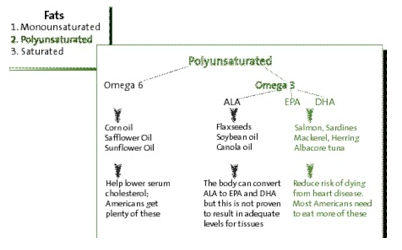Amazing Omega-3s
 Interest in the potential cardiovascular disease protective effects of increasing omega-3s began with studies of the Inuit. These Greenland Eskimos were found to have a low risk of heart disease despite a diet that was high in fat and cholesterol. Since the 1970s, the beneficial impact of dietary omega-3s has continued to expand.
Interest in the potential cardiovascular disease protective effects of increasing omega-3s began with studies of the Inuit. These Greenland Eskimos were found to have a low risk of heart disease despite a diet that was high in fat and cholesterol. Since the 1970s, the beneficial impact of dietary omega-3s has continued to expand.Omega-3s work several waysThere are several possible ways that omega-3s may reduce the risk of CVD. First, they appear to have a modest blood pressure lowering effect. The blood pressure lowering effect of fish oils appears to be related to DHA, one of the two main omega-3s found in fish. See the chart on page 41 to see a breakdown of omega-3 fatty acids, richest dietary sources and how they impact your health.Second, omega-3s appear to improve blood lipids. omega-3s in the form of fish or fish oils almost always decrease triglycerides, or fats found in the blood, and very low dense lipoprotein levels, also known as VLDL or a type of “bad cholesterol,” often by 30% or more. Omega-3s have a modest HDL raising impact, particularly in those with moderate to high triglyceride levels (>200 mg/dl). However, omega-3s are somewhat more likely to increase LDL, or “bad cholesterol” than to lower it, although there is considerable individual variability in the response to the addition of fish oils to the diet.The consumption of just 2 servings of fish per week was associated with about a 40% decrease in deaths from heart disease in a large prospective study of 20,000 physicians. Overall mortality was also lower in those consuming about 7 ounces of fish weekly compared to those who ate very little or no fish. The consumption of more than 7 ounces of fish per week did not provide additional cardiovascular disease protection. The consumption of fish does tend to increase LDL (unless it displaces other foods in the diet with even more saturated fat (SFA) and/or cholesterol like cheese and red meats) because fish contains both SFA and cholesterol.Omega-3s dramatically reduce deaths from heart attacksOmega-3s help reduce the tendency of blood to clot. Reducing the tendency of blood clots lowers the risk of a fatal heart attack, since most heart attacks occur when blood clots shut off the blood supply to the heart.Another likely mechanism whereby omega-3s could protect against a fatal heart attack is by reducing the risk of irregular heart beats, particularly after a sudden reduction in blood flow, or ischemic event. Omega-3s have been shown to have a stabilizing effect on heart rhythm in animal studies.The impact of omega-3s in stabilizing heart muscle cell membranes and perhaps in reducing clot formation, appear to be the primary mechanisms by which they reduce CVD. There is growing evidence that omega-3s help to stabilize the heart muscle cell membranes during an ischemic event. This reduces the risk of a fatal arrhythmia developing. Because omega-3s do not appear to reduce the risk of having a heart attack (only a fatal one), it appears they may have only a modest impact on the progression of atherosclerosis or clogging of arteries.A 10-year follow up of the Nurses’ Health Study showed a protective effect of omega-3s against a fatal heart attack. The women who consumed the most omega-3s were found to have only about half as many fatal heart attacks compared to those who consumed the least. However, the women consuming more omega-3s were no less likely to have a nonfatal heart attack. This is consistent with a secondary prevention trial in which the subjects who were advised to consume 2 or more servings of fish a week were found to have a 29% reduction in fatal heart attacks compared to those who did not increase fish intake. As with the Nurses’ Health Study, there was no decrease in the number of heart attacks in those subjects advised to eat more fish. Research in animals has demonstrated that omega-3s help to stabilize heart muscle cell membranes and alter electrophysiological events by modulating sodium and calcium channels which may be how they prevent fatal cardiac arrhythmias. Making sure Americans consume about 1% of their total calories as omega-3s, or about 2 servings of cold-water, fatty fish per week, may help to dramatically reduce the 250,000 or so sudden cardiac deaths each year caused by fatal cardiac and heart arrhythmias.Omega-3s May Explain Benefits of Mediterranean DietThe protective effect of a Mediterranean-style diet may be due more to increased omega-3s than to an increase in monounsaturated fat. A 46-month follow-up of the Lyon Diet Heart Study showed a significant reduction in both cardiovascular disease and all cause mortality. These trials showed relatively modest effects on blood lipids or blood pressure. It seems likely that most of the protective effects of a Mediterranean-style diet may be due more to stabilization of myocardial cell membranes and/or a reduced tendency of blood to clot rather than to decreased atherosclerosis.By Dr. James J. KenneyDr. James J. Kenney, PhD, RD, FACN, is the Director of Research for the Pritikin Longevity Center. He is Board Certified as a Specialist in Human Nutrition by the American Board of Nutrition.For a comprehensive review of the diet and cardiovascular disease, see 21st Century Heart. This new kit contains compelling, easy-to-use client materials along with full text articles and a 20 hour CPE course.This article is also available in a full text version with references or with a post-test for 1 CPE hour - see the insert for ordering information. FMI call 800-462-2352 or see www.foodandhealth.com/


